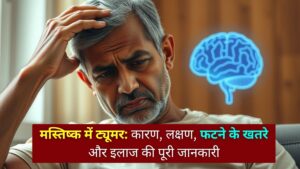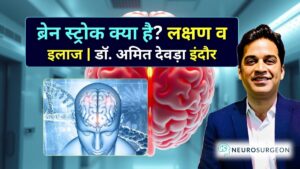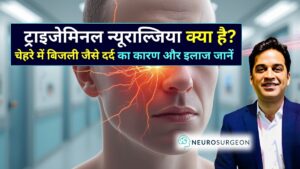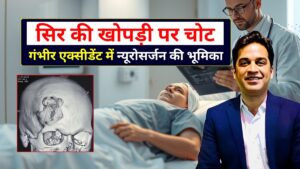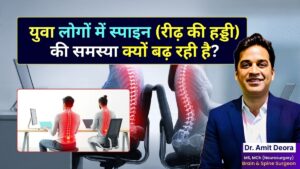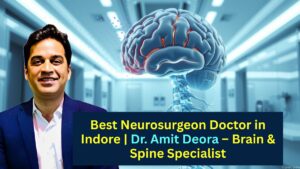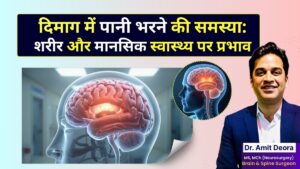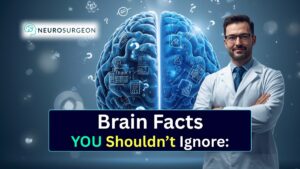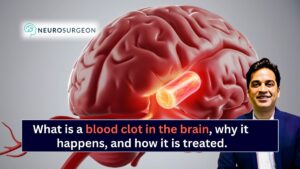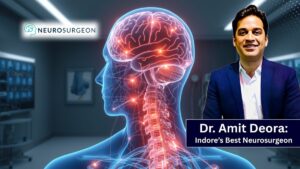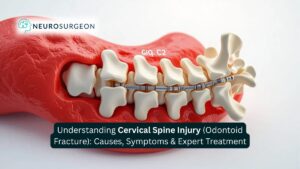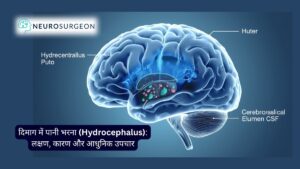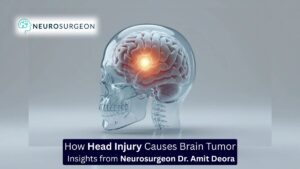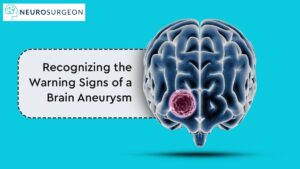A brain stroke is a sudden medical emergency in which blood flow to the brain is disrupted, causing brain cells to die due to a lack of oxygen. This can happen either because of a blocked artery (ischemic stroke) or the rupture of a blood vessel (hemorrhagic stroke).
Dr. Amit Deora, regarded as the Best Neurosurgeon Doctor In Indore, explains that strokes are time-sensitive conditions. The sooner you get medical help, the better the chances of recovery with minimal damage to the brain.
Strokes can affect movement, speech, vision, memory, and even personality depending on the area of the brain affected. According to Dr. Amit Deora, patients who are treated quickly have a much higher survival rate and improved long-term outcomes.
Table of Contents
Toggle1. What Are the Early Signs of Brain Stroke? Insights By Dr. Amit Deora
One of the most important factors in surviving a brain stroke is recognizing the symptoms early. According to Dr. Amit Deora, the Best Neurosurgeon Doctor In Indore, you should remember the acronym BE FAST:
- Balance loss or dizziness
- Eyesight problems in one or both eyes
- Face drooping on one side
- Arm weakness or numbness
- Speech difficulties
- Time to call emergency services immediately
Other possible symptoms include confusion, severe headache, difficulty understanding speech, and numbness in the limbs. Dr. Amit Deora warns that even if the symptoms last for only a few minutes, it could be a transient ischemic attack (TIA), also known as a mini-stroke, which often precedes a major one.
2. What Causes Brain Stroke? Explained by the Best Neurosurgeon Doctor In Indore, Dr. Amit Deora

Understanding the root causes of brain stroke is key to prevention. Dr. Amit Deora, identifies multiple risk factors:
- High Blood Pressure (Hypertension) – the number one cause of strokes
- Heart Disorders – like atrial fibrillation, which can lead to clot formation
- Diabetes – increases risk of vascular damage
- High Cholesterol and Obesity
- Smoking and Excessive Alcohol Use
- Sedentary Lifestyle and Poor Diet
Even stress and lack of sleep can increase the likelihood of a brain stroke, says Dr. Amit Deora. He emphasizes routine health check-ups and healthy living as the first line of defense.
3. How Is Brain Stroke Diagnosed: Dr. Amit Deora
Accurate and quick diagnosis is critical in managing a brain stroke. Dr. Amit Deora, known as the Best Neurosurgeon Doctor In Indore, uses advanced diagnostic tools to assess stroke type and severity:
- CT Scan or MRI to identify bleeding or blockage in the brain
- Carotid Ultrasound to check for blocked neck arteries
- Cerebral Angiogram for a detailed view of brain blood vessels
- Blood Tests to evaluate cholesterol, clotting, and sugar levels
- Electrocardiogram (ECG) to detect heart rhythm issues
These tests help Dr. Amit Deora determines whether the stroke is ischemic or hemorrhagic, which directly affects the treatment approach.
4. What Are the Treatment Options for Brain Stroke?
The treatment for brain stroke depends on its type. Dr. Amit Deora, the Best Neurosurgeon Doctor In Indore, tailors treatment based on each patient’s unique condition:
For Ischemic Stroke (Clot Blockage):
- Thrombolysis: Administering clot-busting medication like tPA within the golden window (typically 4.5 hours).
- Mechanical Thrombectomy: Surgical removal of the clot using a catheter.
- Blood Thinners: To prevent further clots.
For Hemorrhagic Stroke (Bleeding):
- Surgical Repair: Of ruptured blood vessels or aneurysms.
- Clip or Coil Procedures: To prevent re-bleeding.
- Medication: To control blood pressure and prevent seizures.
Thanks to advanced techniques and the surgical expertise of Dr. Amit Deora, patients in Indore have access to world-class stroke care.
5. What Is the Recovery Process After a Brain Stroke?

Recovery from a brain stroke doesn’t stop at the hospital. Dr. Amit Deora, recognized as the Best Neurosurgeon Doctor In Indore, explains that rehabilitation is a crucial step to regaining lost functions:
- Physical Therapy: To improve strength, coordination, and mobility
- Occupational Therapy: To relearn daily activities like dressing, cooking, and bathing
- Speech Therapy: For speech, language, and swallowing issues
- Neuropsychological Support: To cope with emotional and cognitive challenges
The road to recovery can be long, but under the care of Dr. Amit Deora, stroke survivors are given a comprehensive rehabilitation plan that prioritizes independence and quality of life.
6. How Can Brain Stroke Be Prevented? Expert Advice By Dr. Amit Deora
Prevention is the most powerful tool against brain stroke. Dr. Amit Deora, the Best Neurosurgeon Doctor In Indore, offers the following prevention tips:
- Monitor Blood Pressure and Blood Sugar regularly
- Exercise Daily – even a 30-minute walk can help
- Eat a Balanced Diet – rich in fruits, vegetables, whole grains, and lean proteins
- Quit Smoking and Limit Alcohol intake
- Stay Hydrated and Sleep Well
- Take Prescribed Medications consistently
Regular neurological consultations with specialists like Dr. Amit Deora can catch early signs of vascular and neurological problems before they escalate.
Final Words
A brain stroke is a life-altering event, but with the right medical attention and lifestyle choices, it can be managed and even prevented. Dr. Amit Deora, combines clinical excellence with compassionate care, ensuring that every patient receives timely, personalized, and effective treatment.
If you or a loved one shows any signs of stroke, don’t wait, contact the Best Neurosurgeon Doctor In Indore, Dr. Amit Deora, immediately. Prompt action can save a life and preserve the quality of living.

